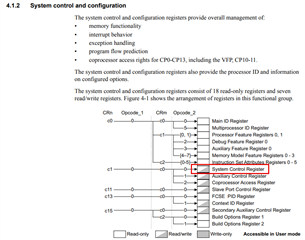Tool/software:
Hello,
Description mentioned to "..implement a test to confirm proper operation of all control register writes".
According to Cortex -R4 and Cortex-R4F Revision: r1p3 Technical Reference Manual, Chapter 4 System Control Coprocessor provides the following list :

Does it means that for all of them, as exemple below we need to create some manual test perfomed at startup such as write some random values and then read that they are correctly written using the CPU coprocessor read and write commands. (in assembly code) ( and not just read them)
Example

--> System Control Register : random values then read using the commands such as :
MCR p15, 0, , c1, c0, 0 ; Write System Control Register configuration data --> Write specific value
MRC p15, 0, , c1, c0, 0 ; Read System Control Register configuration data --> Confirm value written.
Repeat for all others register.
If all fine, then let the startup code initialized the registers to requested value. Is this would be correct ?
I guess the test does not requires to test the General Registers (R0 to R15) ?
Thank you !
Regards,
Marc



